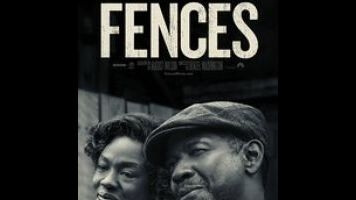Denzel Washington shines in an inconsistent adaptation of August Wilson’s classic Fences

August Wilson’s Fences gave the American stage one of its greatest characters: Troy Maxson, an illiterate garbage man, former Negro League baseball player, and multi-faceted tragic figure from the mid-1950s Pittsburgh of Wilson’s childhood. Directing himself in a largely competent film adaptation, Denzel Washington has this role down pat. He understands the “largeness” described in Wilson’s stage directions to be a shadow that Troy casts over the people in his life, tracing his eventual downfall in silhouette. He is a jocular, intimidating, hardworking, selfish man whose character is found in the hypocrisies that Wilson writes as crises. Washington gives a magnetic, layered performance, backed by a largely superb cast, most of whom reprise their roles from the Broadway revival of Wilson’s classic. But the film itself is eluded by the epic qualities of the original text, which play directly to the captive space of the theater.
In the early going, Fences seems as good a Wilson as one might ask for, rolling along on the late playwright’s uninterrupted dialogue, listening in on Troy and his close friend, Bono (Stephen Henderson), one of those characters of pure theater who spends every scene explaining how he’s about to leave. The audience meets Troy’s wife, Rose (Viola Davis), and endures his tall tales and his belittling comments to Lyons (Russell Hornsby), a son from a previous marriage who has come to borrow money. Washington follows the continually changing subjects of Wilson’s dialogue as it introduces and gradually complicates Troy’s failings, seen through his relationships to Rose, his brother, brain-damaged Gabriel (Mykelti Williamson), and his teenage son Cory (Jovan Adepo), who may have a chance to go to college on a football scholarship.
Troy is a womanizer who depends on his wife; an overbearing father who trivializes his sons’ dreams but feels that he was unfairly robbed of his own; a reformed ex-con who proudly carries his hard-earned money every Friday to a house he bought with this brother’s disability compensation. Washington’s performance effortlessly navigates the character’s complexities, delusions, and contradictions, partnered with a slow-churning mix of willpower and vulnerability that Davis brings to her role. But as a director, he is at as his best when he’s at his stodgiest, using the camera only to position standing or sitting actors in relation to each other. He knows acting, and knows how to frame actors in conversation, which is a rarer skill than it should be. But with anything abstract, his direction turns clumsy and overemphatic.
It is the tumultuous second act that turns out to be the film’s stumbling block. The interiority of the source material would pose a challenge for most filmmakers, given that Wilson’s play is set entirely in the back yard of the Maxson house and is told in gaps; its key events happen off-stage, often involving characters who are never seen. The film script—based on an unfinished draft by Wilson, who died in 2005—doesn’t muck with the dialogue or add characters. Instead, it opts to break up scenes across multiple locations and to fill in points with brief wordless sequences or montages, ultimately betraying the stark and elliptical structure of the drama to which it tries to be so faithful. It dulls the tragic arc. It’s one of those cases where a stubbornly stagey adaptation would be more cinematic.